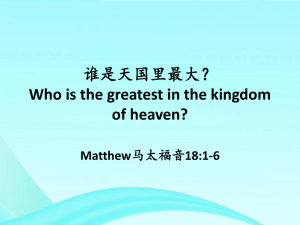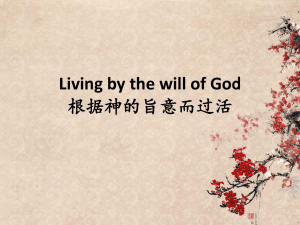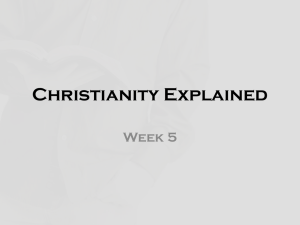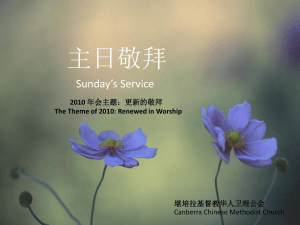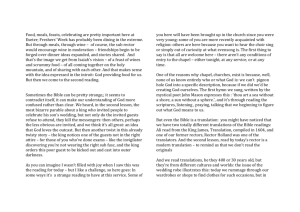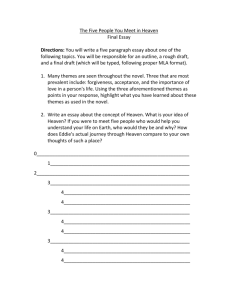Care of Creation Theology
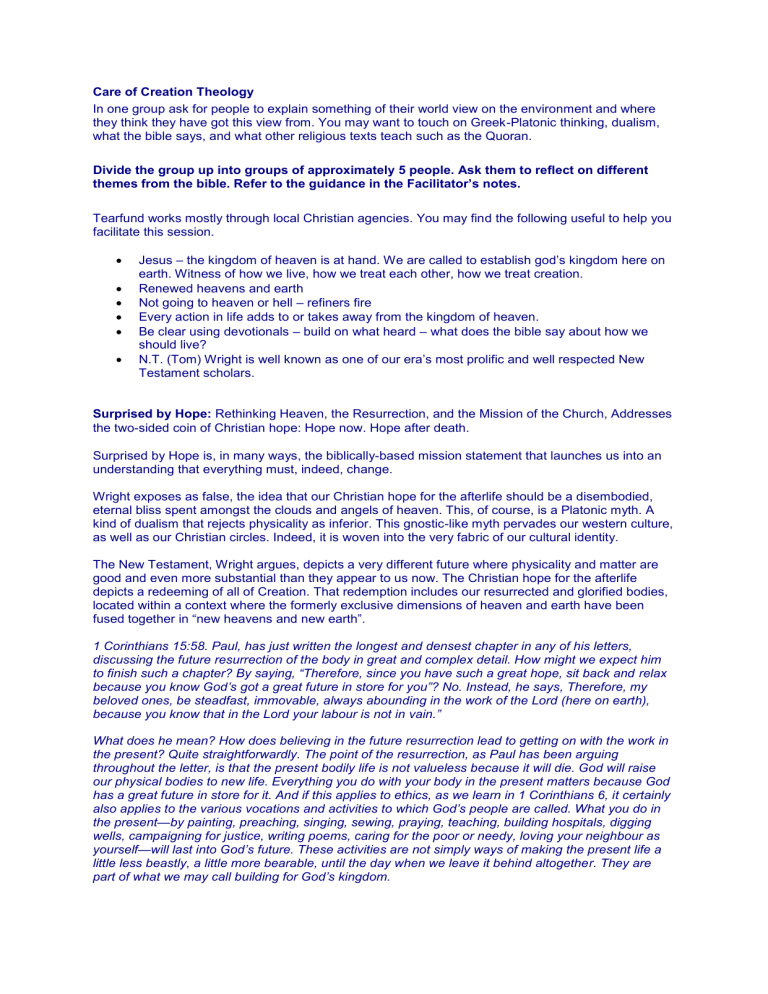
Care of Creation Theology
In one group ask for people to explain something of their world view on the environment and where they think they have got this view from. You may want to touch on Greek-Platonic thinking, dualism, what the bible says, and what other religious texts teach such as the Quoran.
Divide the group up into groups of approximately 5 people. Ask them to reflect on different themes from the bible. Refer to the guidance in the Facilitator’s notes.
Tearfund works mostly through local Christian agencies. You may find the following useful to help you facilitate this session.
Jesus – the kingdom of heaven is at hand. We are called to establish god’s kingdom here on earth. Witness of how we live, how we treat each other, how we treat creation.
Renewed heavens and earth
Not going to heaven or hell – refiners fire
Every action in life adds to or takes away from the kingdom of heaven.
Be clear using devotionals – build on what heard – what does the bible say about how we should live?
N.T. (Tom) Wright is well known as one of our era’s most prolific and well respected New
Testament scholars.
Surprised by Hope: Rethinking Heaven, the Resurrection, and the Mission of the Church, Addresses the two-sided coin of Christian hope: Hope now. Hope after death.
Surprised by Hope is, in many ways, the biblically-based mission statement that launches us into an understanding that everything must, indeed, change.
Wright exposes as false, the idea that our Christian hope for the afterlife should be a disembodied, eternal bliss spent amongst the clouds and angels of heaven. This, of course, is a Platonic myth. A kind of dualism that rejects physicality as inferior. This gnostic-like myth pervades our western culture, as well as our Christian circles. Indeed, it is woven into the very fabric of our cultural identity.
The New Testament, Wright argues, depicts a very different future where physicality and matter are good and even more substantial than they appear to us now. The Christian hope for the afterlife depicts a redeeming of all of Creation. That redemption includes our resurrected and glorified bodies, located within a context where the formerly exclusive dimensions of heaven and earth have been fused together in “new heavens and new earth”.
1 Corinthians 15:58. Paul, has just written the longest and densest chapter in any of his letters, discussing the future resurrection of the body in great and complex detail. How might we expect him to finish such a chapter? By saying, “Therefore, since you have such a great hope, sit back and relax because you know God’s got a great future in store for you”? No. Instead, he says, Therefore, my beloved ones, be steadfast, immovable, always abounding in the work of the Lord (here on earth), because you know that in the Lord your labour is not in vain.”
What does he mean? How does believing in the future resurrection lead to getting on with the work in the present? Quite straightforwardly. The point of the resurrection, as Paul has been arguing throughout the letter, is that the present bodily life is not valueless because it will die. God will raise our physical bodies to new life. Everything you do with your body in the present matters because God has a great future in store for it. And if this applies to ethics, as we learn in 1 Corinthians 6, it certainly also applies to the various vocations and activities to which God’s people are called. What you do in the present —by painting, preaching, singing, sewing, praying, teaching, building hospitals, digging wells, campaigning for justice, writing poems, caring for the poor or needy, loving your neighbour as yourself —will last into God’s future. These activities are not simply ways of making the present life a little less beastly, a little more bearable, until the day when we leave it behind altogether. They are part of what we may call building for God’s kingdom.
When the issue of God’s kingdom arises, so to, inevitably, does the issue of salvation. Isn’t God’s
Kingdom the disembodied paradise we commonly call Heaven? And isn’t, therefore, salvation, about getting there when we die? No. Clearly not. First of all, the Kingdom of God in the gospels speaks of
God’s reign and will, not his abode. And, that being the case, this of course, shines new light on the meaning of salvation. Salvation is not primarily about individuals and their postmortem destination.
And today the invitation, as always, is to join with the Creator in His task of bringing to bear the values of His Kingdom over the good, beloved and Spirit-reflective Creation. And we do this in anticipation of when He will, once, for all, and completely, fuse the realms of heaven and earth in a new harmonious, spiritual/physical unity.
And today the invitation, as always, is to join with the Creator in His task of bringing to bear the values of His Kingdom over the good, beloved and Spirit-reflective Creation. And we do this in anticipation of when He will, once, for all, and completely, fuse the realms of heaven and earth in a new harmonious, spiritual/physical unity.
I cite (Plass) simply as a classic example —all the more powerful because at this point he is so clearly articulating what so many take for granted —of the normal Western Christian view: that salvation is about “my relationship with God” in the present and about “going home to God and finding peace” in the future… Those of us who have known this tradition all our lives—not just an evangelical tradition, by the way, but at this point the entire tradition of the Western church —will recognize his summary as being what most Christians believe and, indeed, what most non-Christians assume Christians believe.
And, to make the point once more as forcibly as I can, this belief is simply not what the New
Testament teaches.
And next, Wright addresses why getting this issue right is of such import for our understanding of
Christian mission. The Bishop continues,
As long as we see salvation in terms of going to Heaven when we die, the main work of the church is bound to be seen in terms of saving souls for that future. But when we see salvation, as the New
Testament sees it, in terms of God’s promised new heavens and new earth and of our promised resurrection to share in that new and gloriously embodied reality —what I have called life after life after death —then the main work of the church here and now demands to be rethought in consequence.
Later Wright clarifies further, by helping us to reframe the question, to which the good news of the gospel becomes the answer (and here he very much echoes McLaren in Everything Must Change).
Wright says,
If the question is, How can I get to heaven despite the sin because of which I deserve to be punished? The answer may well be, Because Jesus has been punished in your place. But if the question is, How can God’s plan to rescue and renew the entire world go ahead despite the corruption and decay that have come about because of human rebellion? the answer may well be, Because on the cross Jesus defeated the powers of evil, which have enslaved rebel humans and so ensured continuing corruption. Please note, these and other possible questions and answers are not mutually exclusive. My point is that reframing the question will mean rethinking the various answers we might give the relationship between them.
And on this note, in widening the definition of atonement, Wright stands side by side not only with
McLaren, but also with Scot McKnight in his recent work, A Community Called Atonement. The bottom line is that atonement, and thus salvation, is a many sided issue that requires a multifaceted approach.
No doubt this reframed understanding of Christian hope, identity and mission might seem unfamiliar; especially when the old coining seems so ingrained in our collective western, Christian consciousness. But people such as the Bishop of Durham help to remind us that this has been the hope, the expectation, the plan of God, all along; going right back to the nation of Israel’s mission to be a light to the nations.
And today the invitation, as always, is to join with the Creator in His task of bringing to bear the
values of His Kingdom over the good, beloved and Spirit-reflective Creation. And we do this in anticipation of when He will, once, for all, and completely, fuse the realms of heaven and earth in a new harmonious, spiritual/physical unity.
Group work: In group, each group choose a theme.
Tearfund’s theological basis for engaging in environmental sustainability is:
Stewardship; obedience; as an act of worship; towards restored relationships (with God, self, each other, the earth); as an act of Justice for the poor.
Stewardship: Genesis 2:15-20 - Adam as steward; Luke 16; Matthew 25:15-30 - Parable of Talents
Worship: Genesis 1:22-30: God's love and care for what He made:
God pronounced abundant blessings upon His creation.
God decreed satisfying purposes for His creation.
God established faithful provisions for His creation.
Psalm 19v1: The Heavens declare the glory of God
Psalm 24v1;
Job 38 v 4….
Psalm 96: Let the heavens rejoice, let the earth be glad; let the sea resound, and all that is in it.12 Let the fields be jubilant, and everything in them; let all the trees of the forest sing for joy.13 Let all creation rejoice before the LORD, for he comes, he comes to judge the earth.
Obedience:
1. Romans 12:1 - Offer yourself to God
Restored relationships:
2. Gen 3:17 – ground cursed because of you
3. 1 Cor 12: Members of one body
4. II Corinthians 5:16- 6:2 - Work together
5. Rom 8:22: The whole of creation has been groaning in childbirth
Restored relationships with each other:
Eph 4:31-32 Stop being mean, bad tempered, angry, quarrelling, harsh words, dislike of others.
Instead be kind to each other, tender hearted, forgiving because you belong to Christ
Restored rel with God:
Matthew 6:14: Your heavenly Father will forgive you if you forgive those who sin against you.
1 John 1: 9. But if we confess our sins to him, he can be depended on to forgive us and to cleanse us from every wrong. (And it is perfectly proper for God to do this for us because Christ died to wash away our sins.)
Galatians 5: 22-24. But when the Holy Spirit controls our live he will produce this kind of fruit in us: love, joy, peace, patience, kindness, goodness, faithfulness, gentleness and self-control; and here there is no conflict with Jewish laws. Those who belong to Christ have nailed their natural evil desires to his cross and crucified them there.
Restored rel with the creation:
Justice:
Micah 6v8: He has shown you, O man, what is good. And what does the LORD require of you?
To act justly and to love mercy and to walk humbly with your God.
